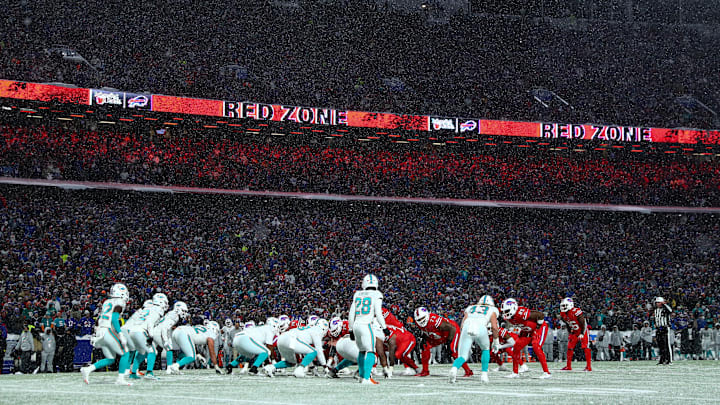The Miami Dolphins and Kansas City Chiefs have matched up 32 times, including three times in the postseason. The franchises split those bouts evenly with 16 wins each, though Miami won all three of their postseason matchups –– including the longest game in NFL history.
Still, those games were nothing like their upcoming Wild Card game on Saturday night. When the game kicks off at 8 p.m. ET, the temperature is forecasted to be -5 degrees, per Accuweather. If that forecast holds, the game will be amongst the coldest games ever recorded in NFL history.
The NFL record book currently lists the 1967 NFL Championship as the coldest playoff game ever. Commonly referred to as the Ice Bowl, the game was played at -13 degrees with -48 wind chill. Only four other postseason games have recorded temperatures colder than tonight's forecasted temperature: the 1981 AFC Championship (-9 degrees), the 1945 NFL Championship (-8 degrees), and a 2015 NFC Wild Card matchup (-6 degrees).
History suggests Kansas City Chiefs will have an edge over Miami Dolphins due to cold weather
The bitter cold can affect game plans and heavy wind can wreak havoc on passing attacks, especially for a team that is used to the sunny beaches of Miami.
The Dolphins have lost 10 consecutive games when the kickoff temperature was 40 degrees or below. To make matters worse, they've lost those games by an average of 17 points and allowed more than 30 points to the opposing team in eight of those 10 games.
Dolphins Result | Temperature | Date |
|---|---|---|
34-31 loss vs. Bills | 27 degrees | January 15, 2023 |
32-29 loss vs. Bills | 29 degrees | December 17, 2022 |
33-17 loss vs. 49ers | 38 degrees | December 4, 2022 |
56-26 loss vs. Bills | 35 degrees | January 3, 2021 |
41-24 loss vs. Browns | 39 degrees | November 24, 2019 |
42-17 loss vs. Bills | 33 degrees | December 30, 2018 |
31-12 loss vs. Packers | 33 degrees | November 11, 2018 |
29-13 loss vs. Chiefs | 23 degrees | December 24, 2017 |
24-16 loss vs. Bills | 22 degrees | December 17, 2017 |
30-12 loss vs. Steelers | 17 degrees | January 8, 2017 |
Of course, this losing streak dates back longer than head coach Mike McDaniel, quarterback Tua Tagovailoa, and most of the current roster has been around. Still, McDaniel and Tagovailoa haven't fared well in cold weather either, which has kept the streak alive.
During his tenure as Miami's head coach, McDaniel has a 16-6 record from September to November. From December to January, he has a 4-9 record. It's a small sample size, but it suggests that his teams are built for early-season success, when opponents struggle in Miami's humidity. Tua is 6-13 in temperatures under 70 degrees and 0-4 in temperatures under 40 degrees.
Kansas City quarterback Patrick Mahomes has a small sample size in cold weather games as well, but his teams have performed much better. Mahomes has recorded a 94.1 passer rating and a 10-1 record when temperatures fall below 40 degrees.
“To me, you just decide whether you’re going to let [the cold weather] factor in or not, and then you adjust as best you can," McDaniel said in 2022. "There’s certain things that become harder when there’s moisture or it hits a certain level of frigidness. But the good news is that there’s not different atmospheres on both sidelines. We will be playing the game in the same elements.”
If there's a silver lining, it's that McDaniel's Dolphins have kept their cold weather losses a lot closer than prior Miami teams. He'll now have the chance to end Miami's cold streak and prove that his Dolphins have the mental toughness to win in any climate.
